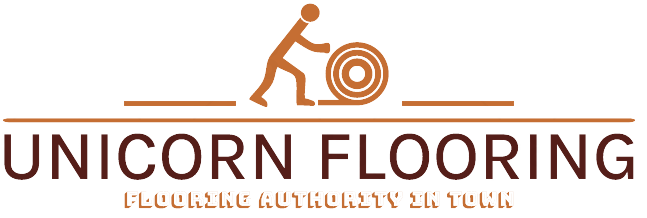Mechanical Room Flooring in Pakistan
When it comes to facility design, one of the most critical yet often overlooked areas is the mechanical room. These rooms are the backbone of a building — housing essential systems such as boilers, chillers, HVAC equipment, pumps, and electrical panels.
Because of the heavy machinery, constant vibration, oil spills, and high temperature variations, choosing the right mechanical room flooring in Pakistan is essential for safety, longevity, and performance.
This comprehensive guide explores the best flooring materials, costs, installation techniques, and maintenance tips for mechanical rooms across Pakistan.
What Is a Mechanical Room and Why Does Flooring Matter?
A mechanical room (also called a utility room or plant room) is a dedicated space in a building for housing mechanical and electrical equipment that keeps operations running — from air conditioning and water pumps to heating and fire protection systems.
The flooring in these rooms must meet specific performance standards, as it supports heavy machinery, withstands vibration, resists chemicals, and ensures easy cleaning.
Here’s why flooring matters:
- Safety: Non-slip surfaces reduce the risk of accidents from oil or water spills.
- Durability: Floors must resist wear, vibration, and impact from heavy equipment.
- Chemical Resistance: Many rooms face exposure to coolants, oils, and lubricants.
- Thermal Stability: Floors should withstand temperature fluctuations without cracking.
- Moisture Resistance: Condensation or leaks should not seep into or damage the surface.
- Easy Maintenance: Quick cleaning and minimal downtime are vital in industrial setups.
In short, mechanical room flooring is not about appearance — it’s about performance, safety, and longevity.
Key Factors to Consider Before Choosing Mechanical Room Flooring
Before selecting a flooring material, evaluate the operational conditions of your facility. The wrong choice can lead to cracking, corrosion, or even electrical hazards.
Here are the main factors to consider:
| Factor | Description | Why It Matters |
|---|---|---|
| Load-Bearing Capacity | The weight of installed machinery and equipment. | Prevents cracking or sinking under heavy loads. |
| Chemical Exposure | Oils, greases, and cleaning chemicals may spill. | Requires chemical-resistant flooring material. |
| Temperature Resistance | Heat from boilers and chillers. | Protects against thermal expansion or surface peeling. |
| Slip Resistance | Water or oil leaks are common. | Prevents worker accidents. |
| Moisture Control | Condensation and plumbing leaks. | Protects floor from bubbling or peeling. |
| Maintenance Requirements | Ease of cleaning and repair. | Reduces downtime and long-term cost. |
| Budget | Material and installation cost. | Determines affordability vs. durability balance. |
Top Flooring Options for Mechanical Rooms in Pakistan
Pakistan’s industrial flooring market offers several materials that can meet the demanding conditions of mechanical rooms. Below are the most reliable and widely used flooring systems in this sector.
Epoxy Flooring

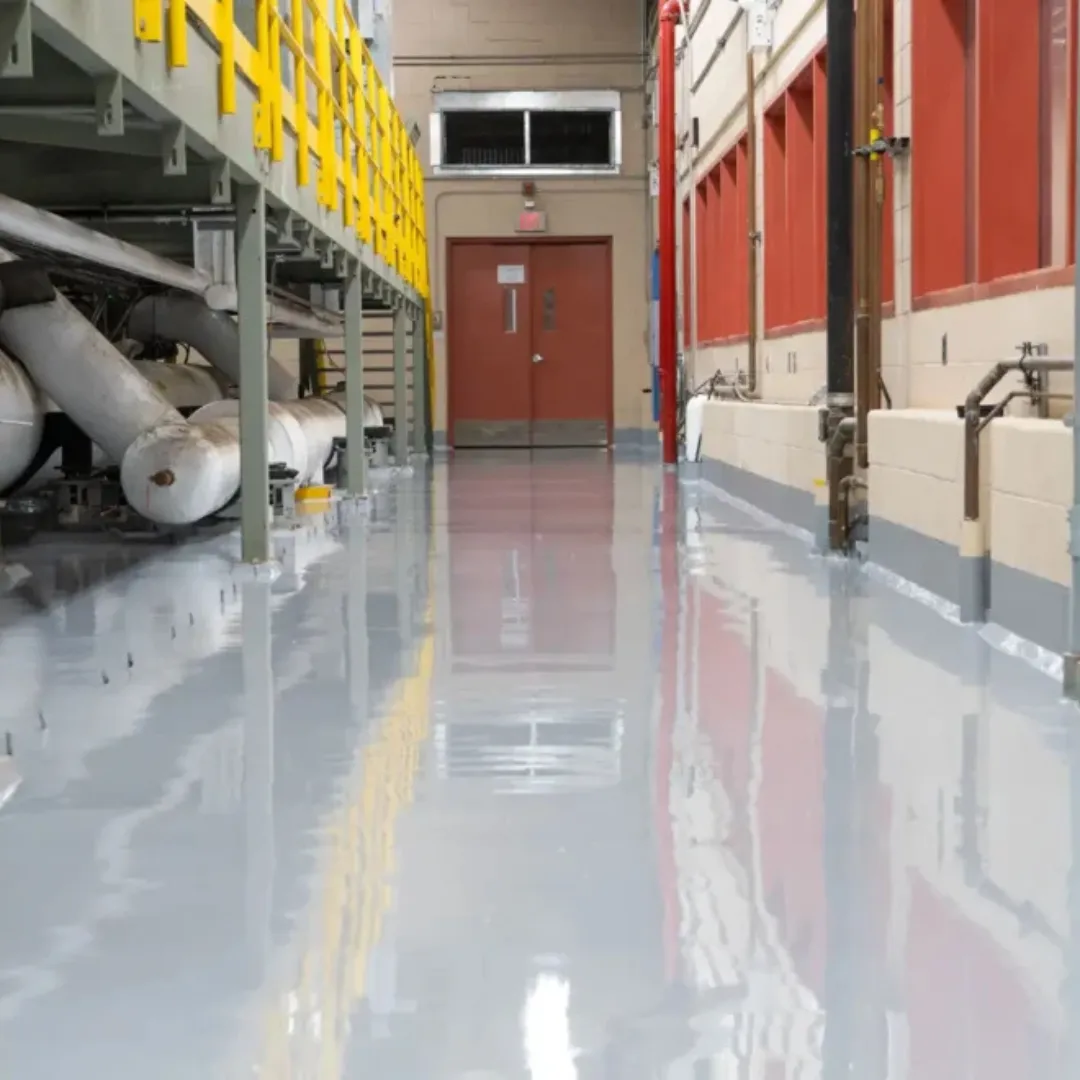
Epoxy flooring is one of the most popular choices for mechanical rooms in Pakistan. It is a resin-based coating system that provides a seamless, non-porous surface with exceptional strength.
Key Advantages
- Resistant to oil, grease, and chemicals.
- Non-slip finishes available for safety.
- Seamless, dust-free, and easy to clean.
- Long-lasting under heavy traffic and vibration.
- Glossy or matte finish options.
Disadvantages
- Sensitive to moisture during installation.
- Requires professional surface preparation.
Cost Range: PKR 400 – 1500 per sq. ft.
Best For: Industrial plants, HVAC rooms, and utility spaces.
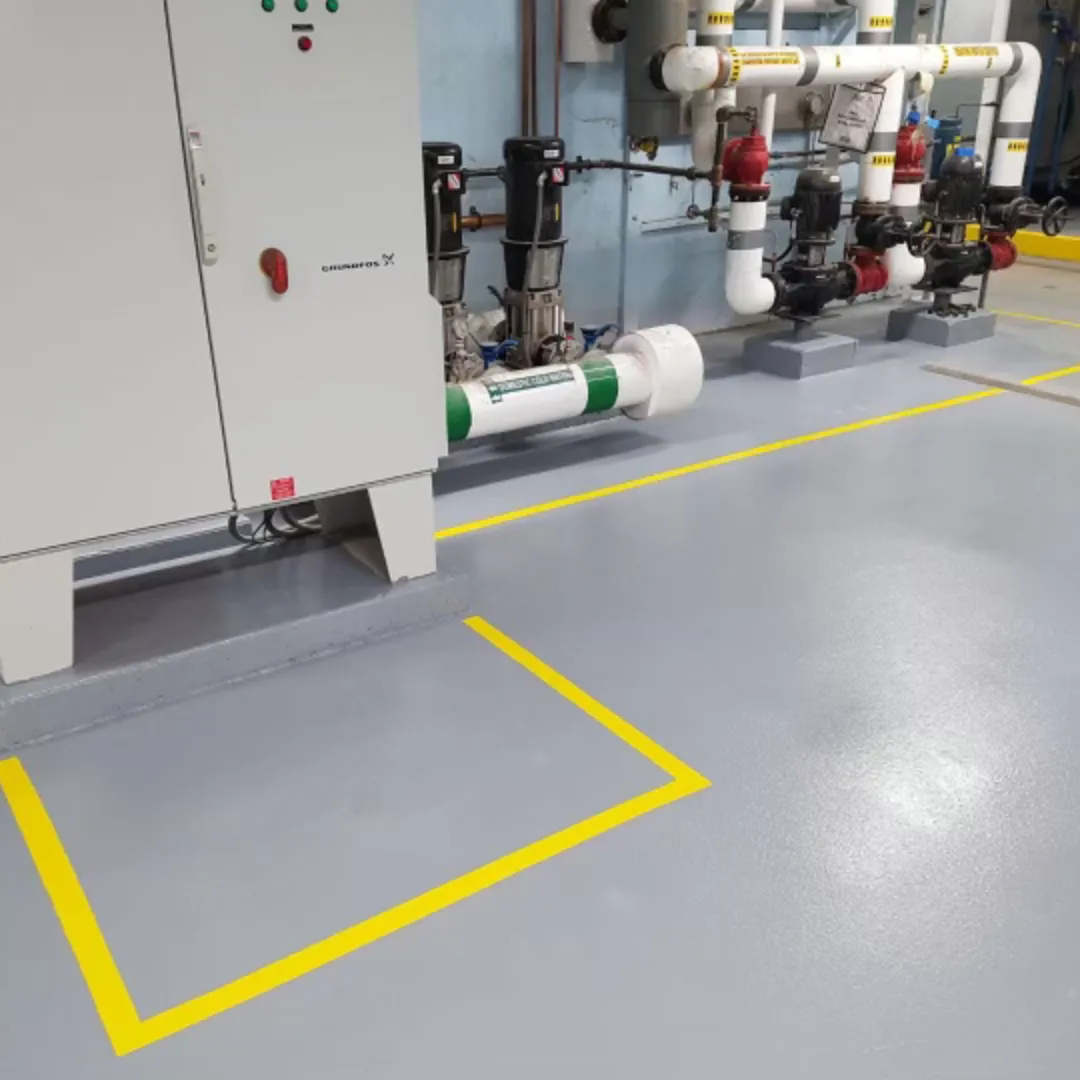
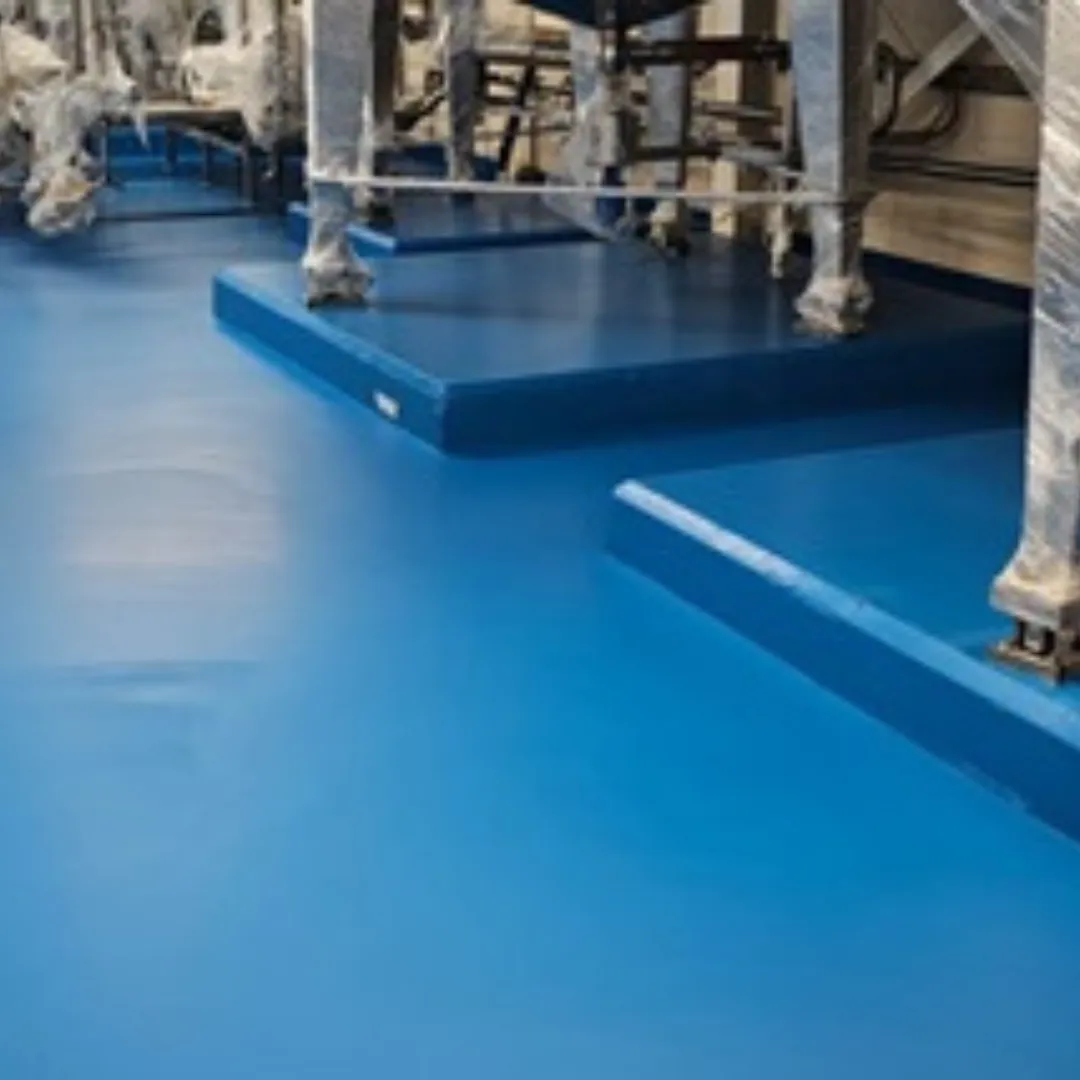
PU (Polyurethane) Flooring
Polyurethane flooring offers a slightly softer and more flexible finish than epoxy, making it ideal for mechanical rooms with vibration and thermal stress.
Key Advantages
- Excellent flexibility — resists cracking under vibration.
- Withstands extreme temperatures and chemicals.
- Seamless and hygienic.
- UV-resistant (for semi-outdoor mechanical spaces).
Disadvantages
- Higher cost than epoxy.
- Requires expert installation and surface preparation.
Cost Range: PKR 700 – 1800 per sq. ft.
Best For: HVAC plants, power stations, and boiler rooms.
Urethane Concrete Flooring
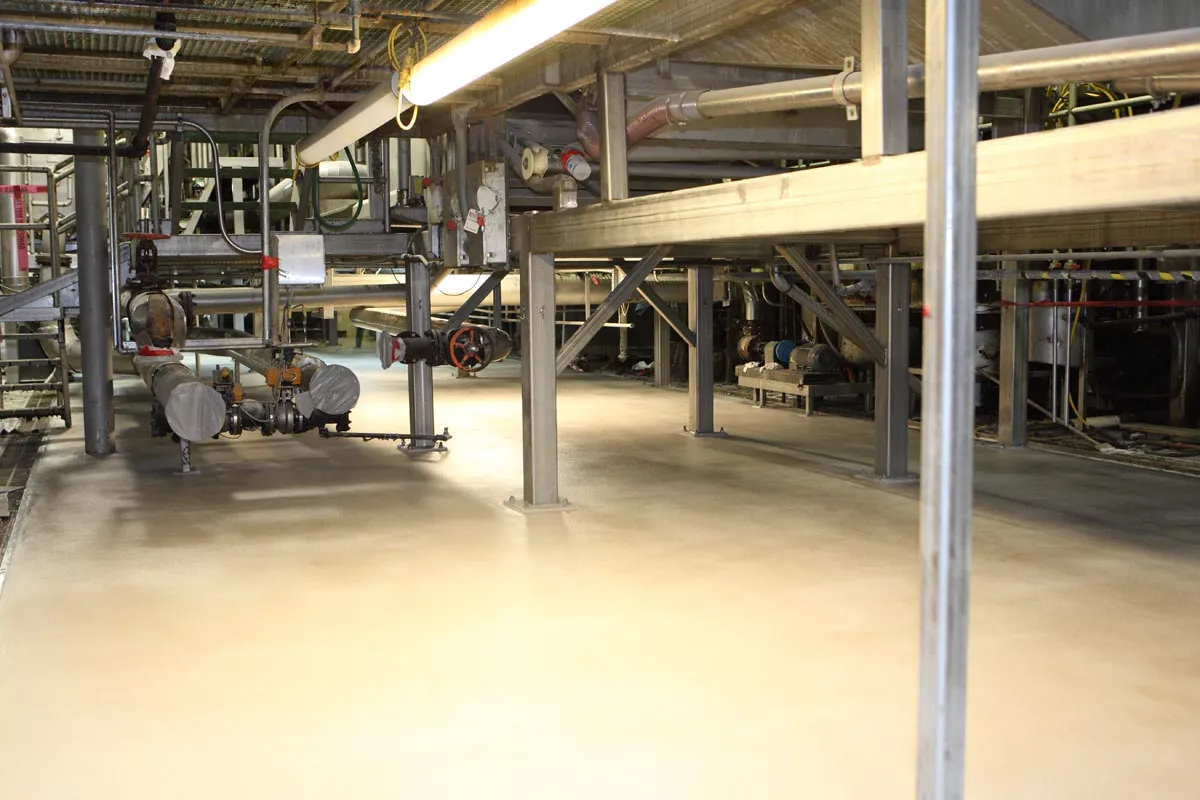
Urethane concrete, also known as PU concrete, is a hybrid flooring system combining polyurethane resin and cementitious materials. It is one of the most durable solutions available.
Key Advantages
- Exceptional strength and heat resistance.
- Handles temperature fluctuations from -40°C to +120°C.
- Resistant to heavy impact, chemicals, and moisture.
- Non-slip and long lifespan.
Disadvantages
- Expensive installation.
- Requires professional applicators.
Cost Range: PKR 1000 – 2500 per sq. ft.
Best For: Heavy-duty mechanical or boiler rooms.
Concrete Flooring (Polished or Sealed)
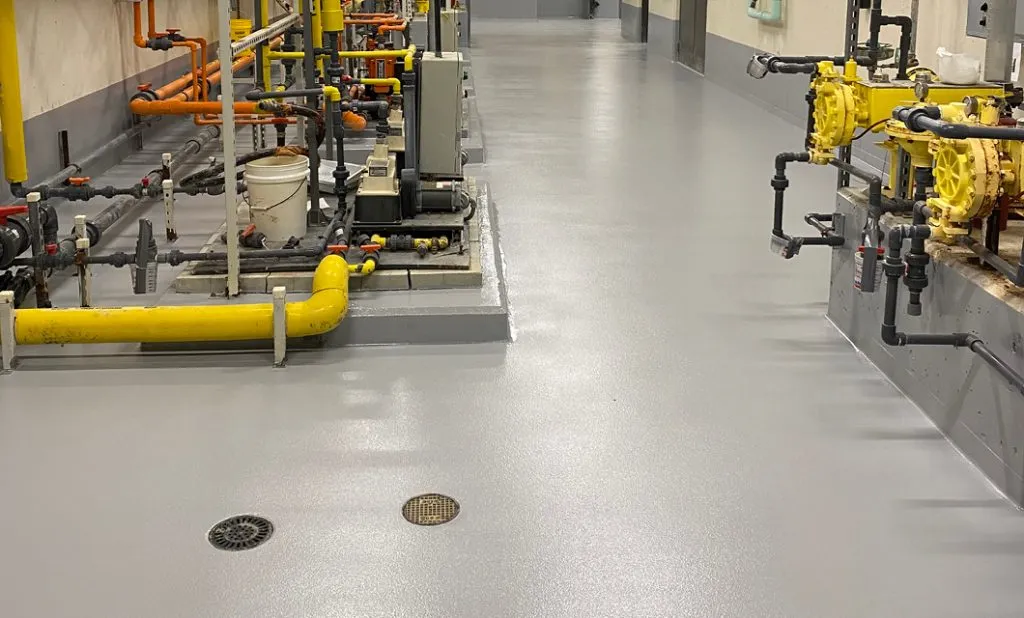
Concrete flooring remains a cost-effective and practical choice for many mechanical rooms in Pakistan. When sealed or polished properly, it provides strength and resistance against wear.
Key Advantages
- Inexpensive and widely available.
- Excellent load-bearing capacity.
- Can be sealed for dust and moisture resistance.
- Long-lasting with minimal upkeep.
Disadvantages
- Can crack under extreme heat or vibration.
- Requires sealing for chemical resistance.
Cost Range: PKR 150 – 600 per sq. ft.
Best For: Budget-friendly mechanical spaces.
Anti-Static Flooring
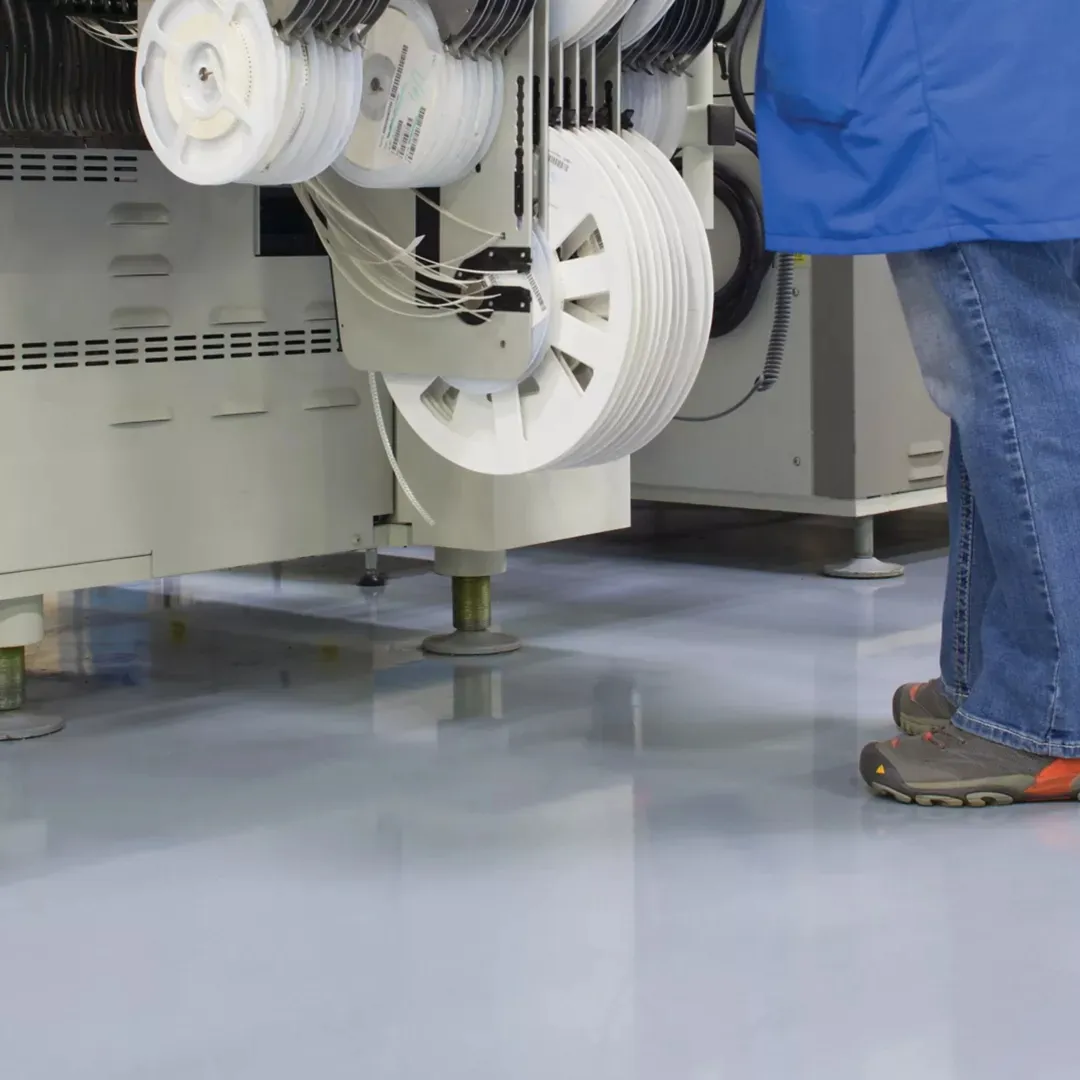

In mechanical rooms with sensitive electrical equipment, anti-static (ESD) flooring helps dissipate static electricity and prevent sparks or damage.
Key Advantages
- Reduces static buildup.
- Safe for electrical panels and control systems.
- Durable and low maintenance.
Disadvantages
- Higher installation cost.
- Requires professional grounding.
Cost Range: PKR 1000 – 2000 per sq. ft.
Best For: Electrical control rooms and data centers.
Comparison Table: Mechanical Room Flooring Options in Pakistan
| Material | Cost Range (PKR/sq.ft.) | Durability | Maintenance | Lifespan | Best Use Case |
|---|---|---|---|---|---|
| Epoxy | 400 – 1500 | Excellent | Low | 10–15 years | HVAC & Utility Rooms |
| PU | 700 – 1800 | Excellent | Low | 15+ years | Boiler & Chiller Rooms |
| Urethane Concrete | 1000 – 2500 | Superior | Low | 20+ years | Heavy-Duty Industrial Rooms |
| Concrete | 150 – 600 | High | Medium | 15+ years | Budget Facilities |
| Anti-Static | 1000 – 2000 | High | Low | 10–15 years | Electrical Control Areas |
Flooring Installation Process in Mechanical Rooms
Installing flooring in mechanical spaces requires precision, as poor surface prep can lead to cracks, bubbling, or peeling. Here’s a general step-by-step process used in Pakistan:
Surface Preparation
- Grinding and cleaning the surface.
- Repairing cracks and ensuring a dry base.
- Moisture testing and priming.
Priming Layer
Application of epoxy or PU primer for bonding.
Base Coating
- Pouring or rolling resin material evenly.
- For concrete, sealants or hardeners are used.
Topcoat Application
Adds UV, chemical, and slip resistance.
Curing & Quality Check
- Allow 24–72 hours for full curing.
- Check for smoothness, adhesion, and finish.
Common Problems and Their Solutions
| Problem | Cause | Solution |
|---|---|---|
| Cracks in flooring | Heavy equipment vibration | Use PU or urethane concrete with flexible base. |
| Peeling or bubbling | Moisture beneath coating | Apply proper moisture barrier before installation. |
| Slippery surface | Glossy topcoat without texture | Add anti-slip additives or texture finish. |
| Chemical damage | Exposure to oils or coolants | Apply chemical-resistant topcoat. |
| Dust buildup | Unsealed or worn concrete | Reseal or upgrade to epoxy flooring. |
Cost Analysis of Mechanical Room Flooring in Pakistan (2025)
Flooring costs depend on the material type, thickness, and surface condition. Here’s a quick overview:
| Flooring Type | Cost Range (PKR/sq.ft.) | Installation Time | Lifespan |
|---|---|---|---|
| Epoxy | 400 – 1500 | 2–3 days | 10–15 years |
| PU | 700 – 1800 | 3–4 days | 15+ years |
| Urethane Concrete | 1000 – 2500 | 4–5 days | 20+ years |
| Concrete | 150 – 600 | 2–5 days | 15+ years |
| Anti-Static | 1000 – 2000 | 3–4 days | 10–15 years |
Note: Prices may vary across major cities like Karachi, Lahore, and Islamabad due to labor rates and material availability.
Applications of Mechanical Room Flooring Across Pakistan
Different industries have specific needs for their mechanical rooms. Here’s a sector-wise breakdown:
| Sector | Recommended Flooring | Reason |
|---|---|---|
| Power Plants | PU / Urethane Concrete | Heat and impact resistance |
| HVAC & Chiller Rooms | Epoxy / PU | Chemical and moisture protection |
| Food Industry | PU | Hygienic and easy to clean |
| Pharmaceutical Units | PU | Seamless, antibacterial surface |
| Commercial Buildings | Epoxy / Concrete | Cost-effective and durable |
| Data Centers | Anti-Static Flooring | Prevents electrical discharge |
Maintenance Tips for Long-Lasting Flooring
To ensure your flooring remains in top condition:
- Clean spills immediately to prevent chemical stains.
- Avoid dropping tools or sharp objects that can chip the surface.
- Regularly inspect joints and corners for cracks.
- Use non-abrasive cleaners for epoxy and PU coatings.
- Reapply topcoat every few years for enhanced protection.
Environmental and Safety Benefits
Modern industrial flooring systems in Pakistan focus on sustainability and worker safety.
- Low-VOC Epoxy and PU Coatings: Reduce harmful emissions.
- Anti-Slip Finishes: Prevent accidents in wet or oily areas.
- Energy Efficiency: Reflective surfaces improve lighting efficiency.
- Chemical Containment: Prevents leaks from contaminating soil or drains.
Choosing an eco-friendly flooring material also supports ISO 14001 compliance and corporate sustainability goals.
Choosing a Flooring Contractor in Pakistan
A professional installation can make the difference between a floor that lasts decades and one that fails within a year. Here’s what to look for:
- Experience: Choose contractors with industrial flooring expertise.
- Site Inspection: Always insist on a site visit before quotation.
- Surface Preparation Tools: Confirm they use grinding and moisture testing.
- Warranty: A good contractor provides material and workmanship warranties.
- Client References: Ask for project photos or references from past installations.
Regional Flooring Trends in Pakistan (2025)
Karachi: High humidity and saline air make PU and epoxy popular choices.
Lahore: Industrial zones prefer urethane concrete for heavy-duty durability.
Islamabad/Rawalpindi: Focus on sustainable and low-maintenance flooring systems.
Faisalabad & Sialkot: Manufacturing units increasingly adopt chemical-resistant PU floors.
Overall, epoxy and PU flooring systems dominate the industrial flooring market due to their cost-effectiveness and long lifespan.
The Future of Mechanical Room Flooring in Pakistan
As Pakistan’s manufacturing and construction sectors continue to modernize, there is growing demand for advanced flooring systems that provide:
- High performance under mechanical and thermal stress.
- Eco-friendly materials with low emissions.
- Faster installation with minimal downtime.
Epoxy, PU, and urethane concrete will remain the leading materials, but hybrid systems (like epoxy-PU blends) and anti-static technologies are expected to grow rapidly.
Conclusion
The mechanical room is one of the most critical spaces in any industrial or commercial facility — housing systems that keep the entire operation running. Therefore, investing in the right flooring system is not optional; it’s essential.
For mechanical room flooring in Pakistan, epoxy, polyurethane (PU), and urethane concrete offer unmatched strength, chemical resistance, and long-term value.
While concrete remains a budget-friendly option, advanced coatings ensure better performance and safety.
By choosing high-quality materials, proper installation, and regular maintenance, you can ensure a durable, safe, and efficient flooring system that supports your facility for decades.
FAQ'S
Epoxy, PU, and urethane concrete are the best choices due to their durability, chemical resistance, and heat tolerance.
Epoxy flooring costs between PKR 400 – 1500 per sq. ft., depending on the grade and surface condition.
Yes, sealed or polished concrete is suitable for low-budget projects but lacks the chemical resistance of epoxy or PU.
PU flooring can last 15+ years with proper installation and regular maintenance.
No, epoxy can be made anti-slip by adding texture or aggregate to the topcoat — ideal for mechanical rooms with oil exposure.
